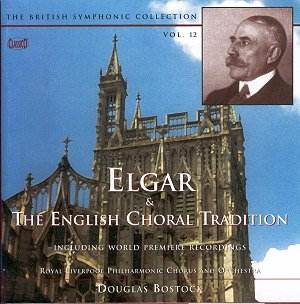The main attraction in this otherwise most desirable release
is the first recording of Howells’ Sine Nomine composed
in 1922 at the instigation of Elgar who also requested a piece from Bliss
(the beautiful Colour Symphony) and of Goossens (Silence
for chorus and orchestra, still unrecorded at the time of writing). Sine
Nomine is scored for soprano and tenor, chorus and orchestra. Voice
parts are wordless as in Ravel’s Daphnis et Chloé, Debussy’s
Sirènes (from Three Nocturnes), let alone the last
movement of Holst’s Planets (all of which he may have heard at
the time he completed his piece) or Nielsen’s Sinfonia espansiva
(which he may not). So, on the whole, this is clearly an orchestral work
in which voices may be considered as an added instrumental colour. The
music, though, is already clearly Howells throughout: densely contrapuntal,
chromatically saturated, lush harmonies, meditative and ecstatic, rising
to some exalted climaxes.
Some time ago, I reviewed a recording of Bridge’s A
Prayer in its alternative version for strings and organ, made
by the composer and an impressive piece in its own right. Nevertheless,
I firmly believe that the present version with full orchestra is still
more impressive. Written in the aftermath of World War I, this powerful
plea for peace and mercy is a minor masterpiece and one can but regret
that Bridge did not compose more choral-orchestral music. The present
performance is, to my mind, one of the finest here. All concerned respond
with conviction and commitment to Bridge’s vision.
Brian’s enthusiasts certainly remember the pioneering
recording of Psalm XXIII issued many years ago by CBS
(as that label was then known), convincingly performed by the Brighton
Festival Chorus and the Leicestershire School Symphony Orchestra conducted
by Laszlo Heltay. Psalm XXIII, composed in 1904 and apparently
rescored in 1945, is one of the early Brian pieces which might have
placed the composer firmly on the musical map of his times. (His music
was then championed by Beecham and Bantock, and was much appreciated
by Elgar.) This powerful setting opens with a typical (for Brian) heavy
march rhythm. The mood is sustained throughout with apparent ease. The
composer allows some lightly scored sections for contrast’s sake, such
as the opening of the fugato section. This piece should have
become popular with choral societies, though it is far from easy, and
the present reading undoubtedly serves this wonderful music well.
Dyson’s highly imaginative The Blacksmiths
may be the odd man out in this composer’s choral output. The music,
thanks to its particularly imaginative scoring, has a stark expressive
power often at odds with Dyson’s tuneful and memorable choral writing,
such as in The Canterbury Pilgrims or Sweet Thames Run Softly.
The alternative version (two pianos, strings and percussion) once available
on Unicorn DKP 9061 (nla?) emphasises still more clearly the originality
of this powerfully atmospheric work which, to me at least, sometimes
hints at Britten (e.g. St. Nicholas) though the original version
with full orchestra (still with one piano) heard here is also quite
impressive.
Finally, two shorter works by Elgar though one of them
is Elgar’s orchestration of a Purcell work. With Proud Thanksgiving,
a movement from For the Fallen, thankfully eschews any jingoism
and is rather a moving tribute to all the lives uselessly lost in World
War I. This is a rousing piece of music with some fine arresting ideas
(the opening sounds not unlike that of Vaughan Williams’ A Sea Symphony).
Elgar’s orchestration of Purcell’s anthem tells us more about Elgar
than about Purcell, as Lewis Foreman rightly remarks in his excellent
notes. This is of course the sort of thing that one would no longer
do in the present "Age of Authenticity"; but, like it or not,
many great works of the past were, as it were, rescued from oblivion
thanks to similar modern arrangements.
Excellent choral singing and superb orchestral playing
magnificently recorded. This is one of the finest instalments of a series
that goes from strength to strength, and a most desirable release on
all counts.
Hubert Culot
